The Cambridge History of China. Vol. 12: Republican China, 1912-1949, Part 1
Подождите немного. Документ загружается.

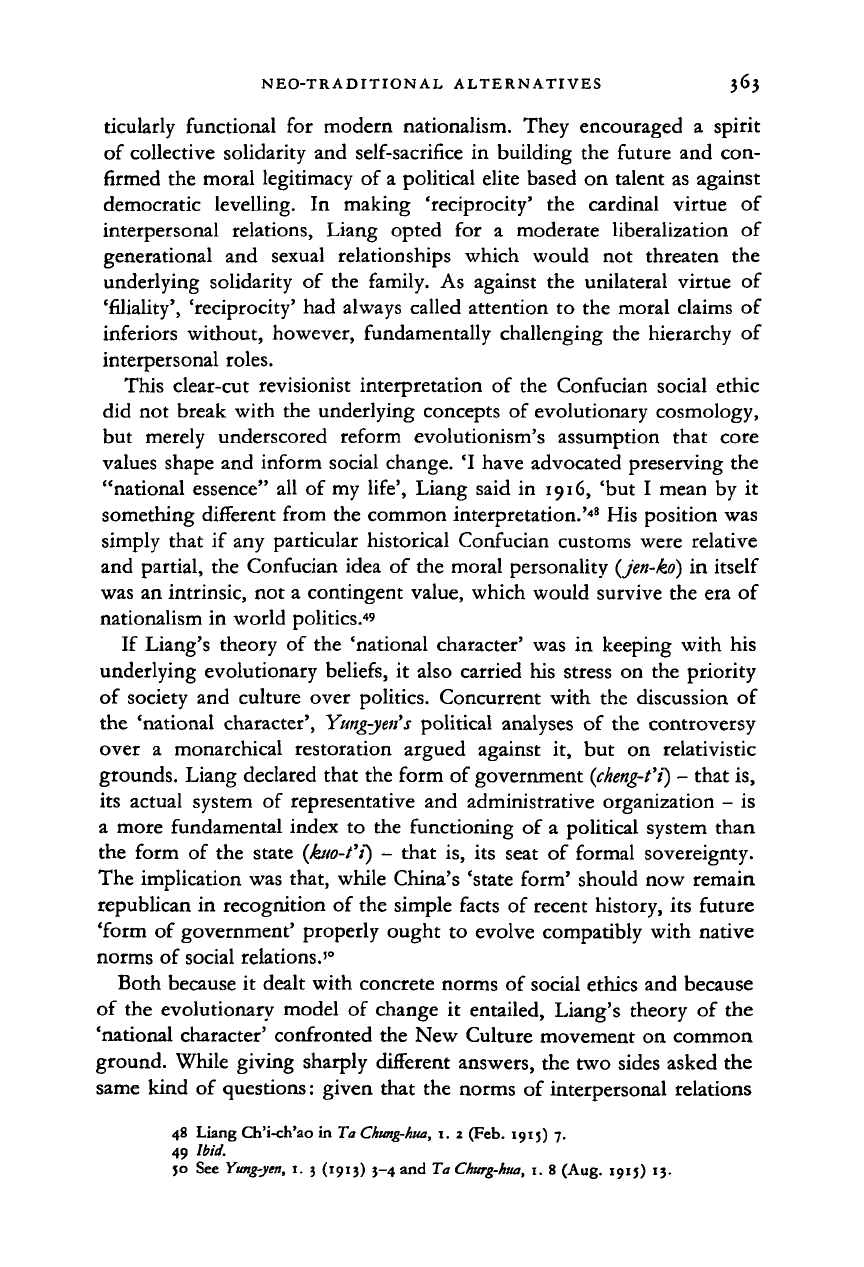
NEO-TRADITIONAL ALTERNATIVES 363
ticularly functional
for
modern nationalism. They encouraged
a
spirit
of collective solidarity
and
self-sacrifice
in
building
the
future
and con-
firmed the moral legitimacy
of
a political elite based
on
talent
as
against
democratic levelling.
In
making 'reciprocity'
the
cardinal virtue
of
interpersonal relations, Liang opted
for a
moderate liberalization
of
generational
and
sexual relationships which would
not
threaten
the
underlying solidarity
of the
family.
As
against
the
unilateral virtue
of
'filiality', 'reciprocity'
had
always called attention
to the
moral claims
of
inferiors without, however, fundamentally challenging
the
hierarchy
of
interpersonal roles.
This clear-cut revisionist interpretation
of the
Confucian social ethic
did
not
break with
the
underlying concepts
of
evolutionary cosmology,
but merely underscored reform evolutionism's assumption that core
values shape
and
inform social change.
'I
have advocated preserving
the
"national essence"
all of
my life', Liang said
in
1916,
'but I
mean
by it
something different from
the
common interpretation.'
48
His
position
was
simply that
if
any particular historical Confucian customs were relative
and partial,
the
Confucian idea
of
the moral personality
(Jen-ko)
in
itself
was
an
intrinsic,
not a
contingent value, which would survive
the era of
nationalism
in
world politics.
49
If Liang's theory
of the
'national character'
was in
keeping with
his
underlying evolutionary beliefs,
it
also carried
his
stress
on the
priority
of society
and
culture over politics. Concurrent with
the
discussion
of
the 'national character',
Yung-yen's
political analyses
of the
controversy
over
a
monarchical restoration argued against
it, but on
relativistic
grounds. Liang declared that
the
form
of
government
(cheng-t'i)
-
that
is,
its actual system
of
representative
and
administrative organization
- is
a more fundamental index
to the
functioning
of a
political system than
the form
of the
state (kiw-t'i)
-
that
is, its
seat
of
formal sovereignty.
The implication was that, while China's 'state form' should
now
remain
republican
in
recognition
of
the simple facts
of
recent history,
its
future
'form
of
government' properly ought
to
evolve compatibly with native
norms
of
social relations.'"
Both because
it
dealt with concrete norms
of
social ethics
and
because
of
the
evolutionary model
of
change
it
entailed, Liang's theory
of the
'national character' confronted
the New
Culture movement
on
common
ground. While giving sharply different answers,
the two
sides asked
the
same kind
of
questions: given that
the
norms
of
interpersonal relations
48 Liang Ch'i-ch'ao
in
Ta
Chung-hua,
1. 2
(Feb. 1915)
7.
49 Ibid.
jo
See
Yung-yen,
1. 3
(1913)
3-4
and
Ta
Churg-htm,
1. 8
(Aug.
191
j)
13.
Cambridge Histories Online © Cambridge University Press, 2008
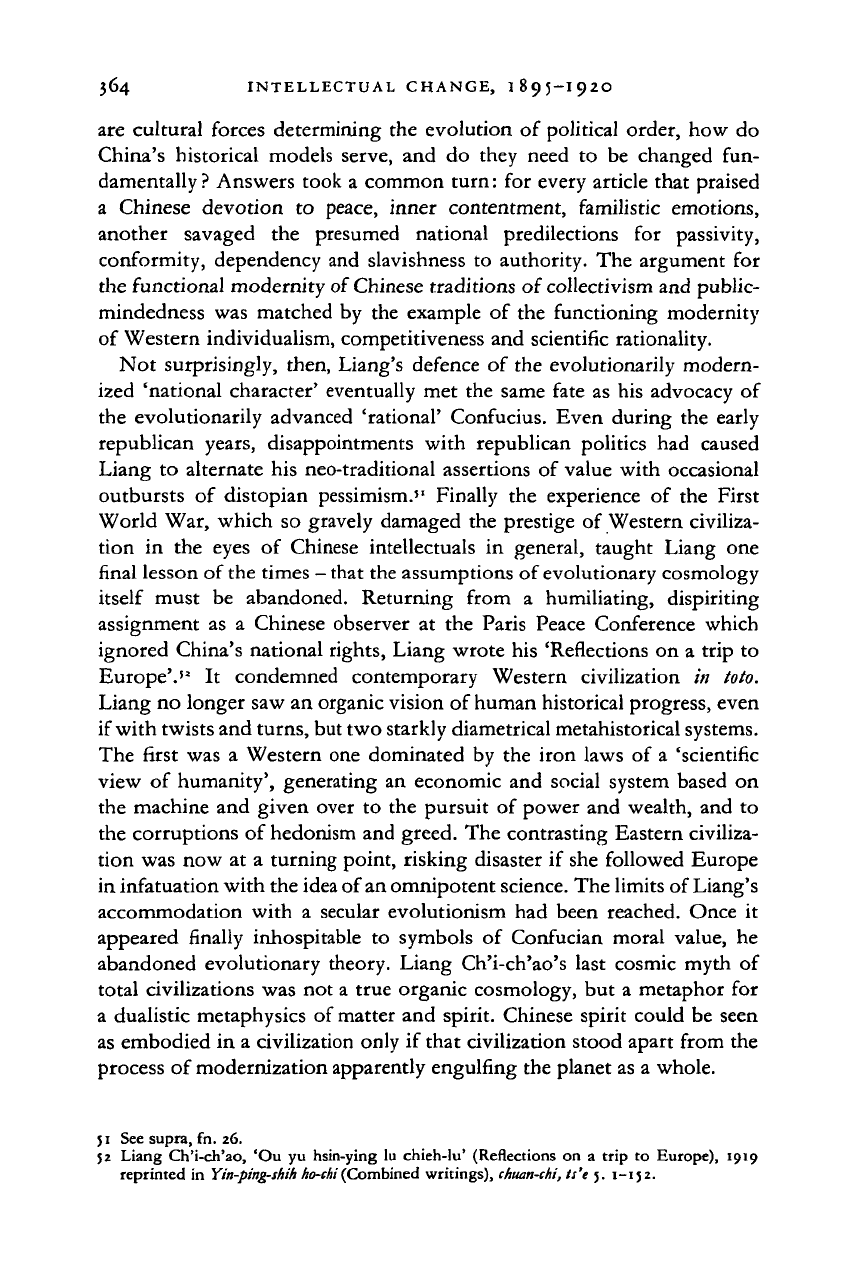
364 INTELLECTUAL CHANGE, 1895-I92O
are cultural forces determining
the
evolution
of
political order,
how do
China's historical models serve,
and do
they need
to be
changed
fun-
damentally? Answers took
a
common turn:
for
every article that praised
a Chinese devotion
to
peace, inner contentment, familistic emotions,
another savaged
the
presumed national predilections
for
passivity,
conformity, dependency
and
slavishness
to
authority.
The
argument
for
the functional modernity of Chinese traditions
of
collectivism and public-
mindedness
was
matched
by the
example
of the
functioning modernity
of Western individualism, competitiveness
and
scientific rationality.
Not surprisingly, then, Liang's defence
of
the evolutionarily modern-
ized 'national character' eventually
met the
same fate
as his
advocacy
of
the evolutionarily advanced 'rational' Confucius. Even during
the
early
republican years, disappointments with republican politics
had
caused
Liang
to
alternate
his
neo-traditional assertions
of
value with occasional
outbursts
of
distopian pessimism.
5
" Finally
the
experience
of the
First
World War, which
so
gravely damaged
the
prestige
of
Western civiliza-
tion
in the
eyes
of
Chinese intellectuals
in
general, taught Liang
one
final lesson
of
the times
-
that the assumptions
of
evolutionary cosmology
itself must
be
abandoned. Returning from
a
humiliating, dispiriting
assignment
as a
Chinese observer
at the
Paris Peace Conference which
ignored China's national rights, Liang wrote
his
'Reflections
on a
trip
to
Europe'.'
2
It
condemned contemporary Western civilization
in
toto.
Liang
no
longer saw
an
organic vision
of
human historical progress, even
if with twists and turns, but two starkly diametrical metahistorical systems.
The first
was a
Western
one
dominated
by the
iron laws
of a
'scientific
view
of
humanity', generating
an
economic
and
social system based
on
the machine
and
given over
to the
pursuit
of
power
and
wealth,
and to
the corruptions
of
hedonism
and
greed. The contrasting Eastern civiliza-
tion was
now at a
turning point, risking disaster
if
she followed Europe
in infatuation with the idea
of
an omnipotent science. The limits of Liang's
accommodation with
a
secular evolutionism
had
been reached. Once
it
appeared finally inhospitable
to
symbols
of
Confucian moral value,
he
abandoned evolutionary theory. Liang Ch'i-ch'ao's last cosmic myth
of
total civilizations
was not a
true organic cosmology,
but a
metaphor
for
a dualistic metaphysics
of
matter
and
spirit. Chinese spirit could
be
seen
as embodied
in a
civilization only
if
that civilization stood apart from
the
process
of
modernization apparently engulfing the planet as
a
whole.
51
See supra,
fn. 26.
52
Liang
Ch'i-ch'ao,
'Ou yu
hsin-ying
lu
chieh-lu' (Reflections
on a
trip
to
Europe),
1919
reprinted
in
Yin-ping-shih
ko-chi
(Combined
writings),
chiian-chi,
ts'e 5.
1-152.
Cambridge Histories Online © Cambridge University Press, 2008
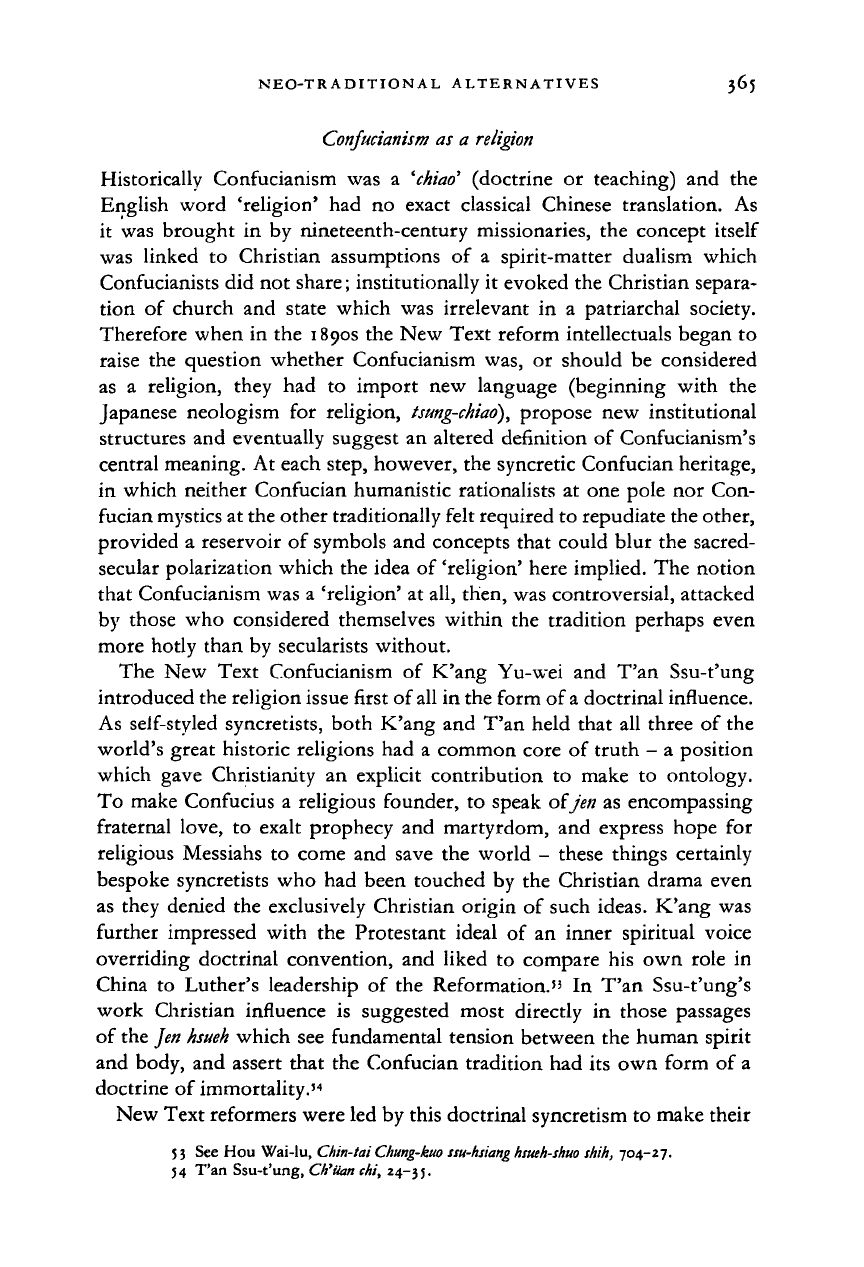
NEO-TRADITIONAL ALTERNATIVES 365
Confucianism
as a
religion
Historically Confucianism
was a
'chiao'
(doctrine
or
teaching)
and the
English word 'religion'
had no
exact classical Chinese translation.
As
it
was
brought
in by
nineteenth-century missionaries,
the
concept itself
was linked
to
Christian assumptions
of a
spirit-matter dualism which
Confucianists
did not
share; institutionally
it
evoked
the
Christian separa-
tion
of
church
and
state which
was
irrelevant
in a
patriarchal society.
Therefore when
in the
1890s
the New
Text reform intellectuals began
to
raise
the
question whether Confucianism
was, or
should
be
considered
as
a
religion, they
had to
import
new
language (beginning with
the
Japanese neologism
for
religion,
tsung-chiao),
propose
new
institutional
structures
and
eventually suggest
an
altered definition
of
Confucianism's
central meaning.
At
each step, however,
the
syncretic Confucian heritage,
in which neither Confucian humanistic rationalists
at one
pole
nor Con-
fucian mystics
at
the other traditionally felt required
to
repudiate the other,
provided
a
reservoir
of
symbols
and
concepts that could blur
the
sacred-
secular polarization which
the
idea
of
'religion' here implied.
The
notion
that Confucianism was
a
'religion'
at
all, then, was controversial, attacked
by those
who
considered themselves within
the
tradition perhaps even
more hotly than
by
secularists without.
The
New
Text Confucianism
of
K'ang Yu-wei
and T'an
Ssu-t'ung
introduced the religion issue first
of
all
in
the form
of
a
doctrinal influence.
As self-styled syncretists, both K'ang
and T'an
held that
all
three
of the
world's great historic religions
had a
common core
of
truth
- a
position
which gave Christianity
an
explicit contribution
to
make
to
ontology.
To make Confucius
a
religious founder,
to
speak oijen
as
encompassing
fraternal love,
to
exalt prophecy
and
martyrdom,
and
express hope
for
religious Messiahs
to
come
and
save
the
world
-
these things certainly
bespoke syncretists
who had
been touched
by the
Christian drama even
as they denied
the
exclusively Christian origin
of
such ideas. K'ang
was
further impressed with
the
Protestant ideal
of an
inner spiritual voice
overriding doctrinal convention,
and
liked
to
compare
his own
role
in
China
to
Luther's leadership
of the
Reformation."
In T'an
Ssu-t'ung's
work Christian influence
is
suggested most directly
in
those passages
of the
Jen hsueh
which
see
fundamental tension between
the
human spirit
and body,
and
assert that
the
Confucian tradition
had its own
form
of a
doctrine
of
immortality.'
4
New Text reformers were
led by
this doctrinal syncretism
to
make their
5 3
See Hou
Wai-lu, Chin-tai
Chung-kuo ssu-hsiang hsueh-shuo
shift,
704-27.
54
T'an
Ssu-t'ung,
Ch'iian
M,
24-35.
Cambridge Histories Online © Cambridge University Press, 2008
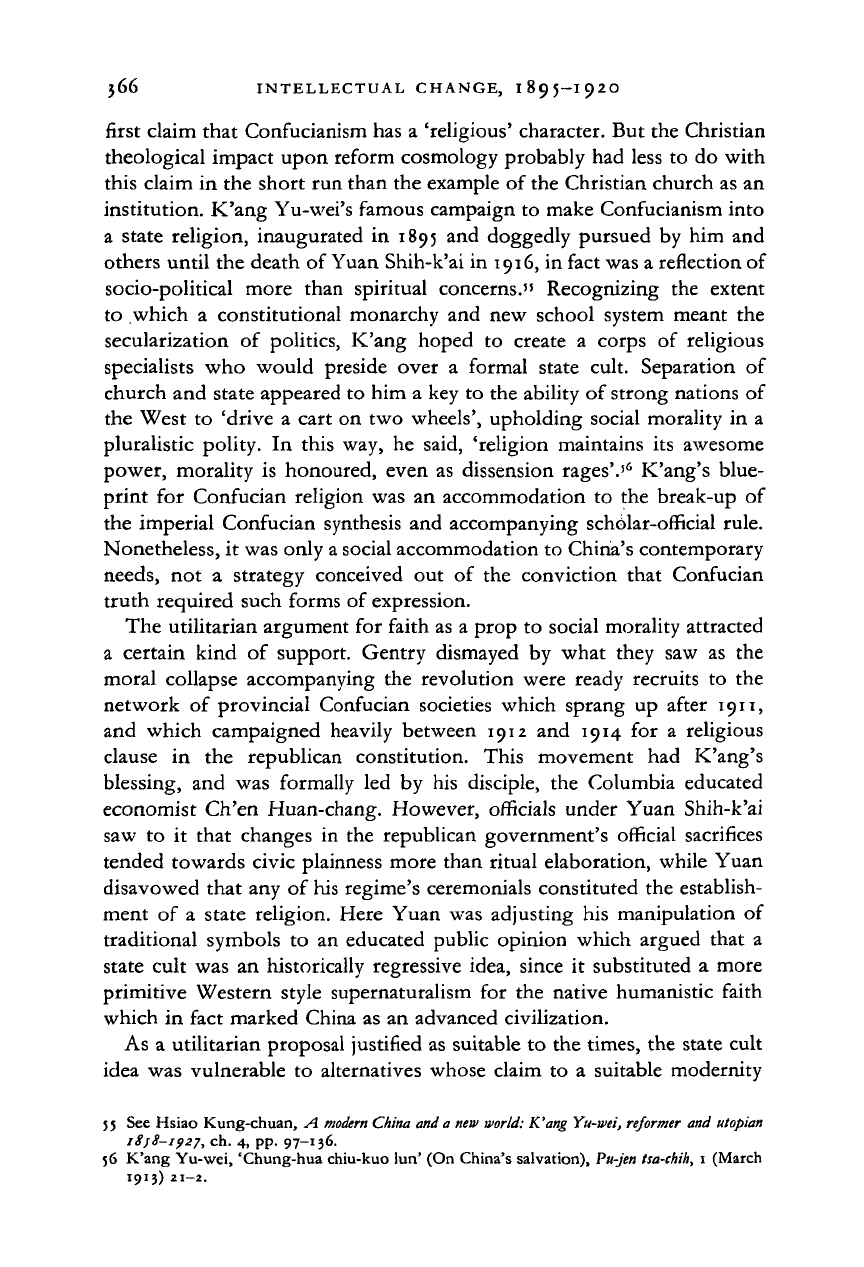
366 INTELLECTUAL CHANGE, 1895-1920
first claim that Confucianism has
a
'religious' character. But the Christian
theological impact upon reform cosmology probably had less to do with
this claim in the short run than the example of the Christian church as an
institution. K'ang Yu-wei's famous campaign to make Confucianism into
a state religion, inaugurated
in
1895 and doggedly pursued by him and
others until the death of Yuan Shih-k'ai in 1916, in fact was a reflection of
socio-political more than spiritual concerns." Recognizing
the
extent
to which
a
constitutional monarchy and new school system meant the
secularization
of
politics, K'ang hoped
to
create
a
corps
of
religious
specialists who would preside over
a
formal state cult. Separation
of
church and state appeared to him a key to the ability of strong nations of
the West to 'drive
a
cart on two wheels', upholding social morality in
a
pluralistic polity.
In
this way,
he
said, 'religion maintains its awesome
power, morality
is
honoured, even as dissension rages'.
iS
K'ang's blue-
print for Confucian religion was an accommodation
to
the break-up of
the imperial Confucian synthesis and accompanying scholar-official rule.
Nonetheless, it was only a social accommodation to China's contemporary
needs,
not
a
strategy conceived out
of
the conviction that Confucian
truth required such forms of expression.
The utilitarian argument for faith as a prop to social morality attracted
a certain kind
of
support. Gentry dismayed
by
what they saw
as the
moral collapse accompanying the revolution were ready recruits
to
the
network
of
provincial Confucian societies which sprang up after 1911,
and which campaigned heavily between 1912 and 1914
for a
religious
clause
in the
republican constitution. This movement
had
K'ang's
blessing, and was formally led
by
his disciple, the Columbia educated
economist Ch'en Huan-chang. However, officials under Yuan Shih-k'ai
saw
to it
that changes in the republican government's official sacrifices
tended towards civic plainness more than ritual elaboration, while Yuan
disavowed that any of his regime's ceremonials constituted the establish-
ment
of a
state religion. Here Yuan was adjusting his manipulation of
traditional symbols
to
an educated public opinion which argued that
a
state cult was an historically regressive idea, since
it
substituted
a
more
primitive Western style supernaturalism
for
the native humanistic faith
which in fact marked China as an advanced civilization.
As
a
utilitarian proposal justified as suitable to the times, the state cult
idea was vulnerable
to
alternatives whose claim to
a
suitable modernity
55
See Hsiao Kung-chuan,
A
modern
China and a new
world:
K'ang
Yu-wei, reformer and
Utopian
18)8-1927,
ch.
4,
pp.
97-136.
56
K'ang
Yu-wei,
'Chung-hua chiu-kuo
lun' (On
China's
salvation),
Pu-jen
tsa-chih,
i
(March
1913) 21-2.
Cambridge Histories Online © Cambridge University Press, 2008
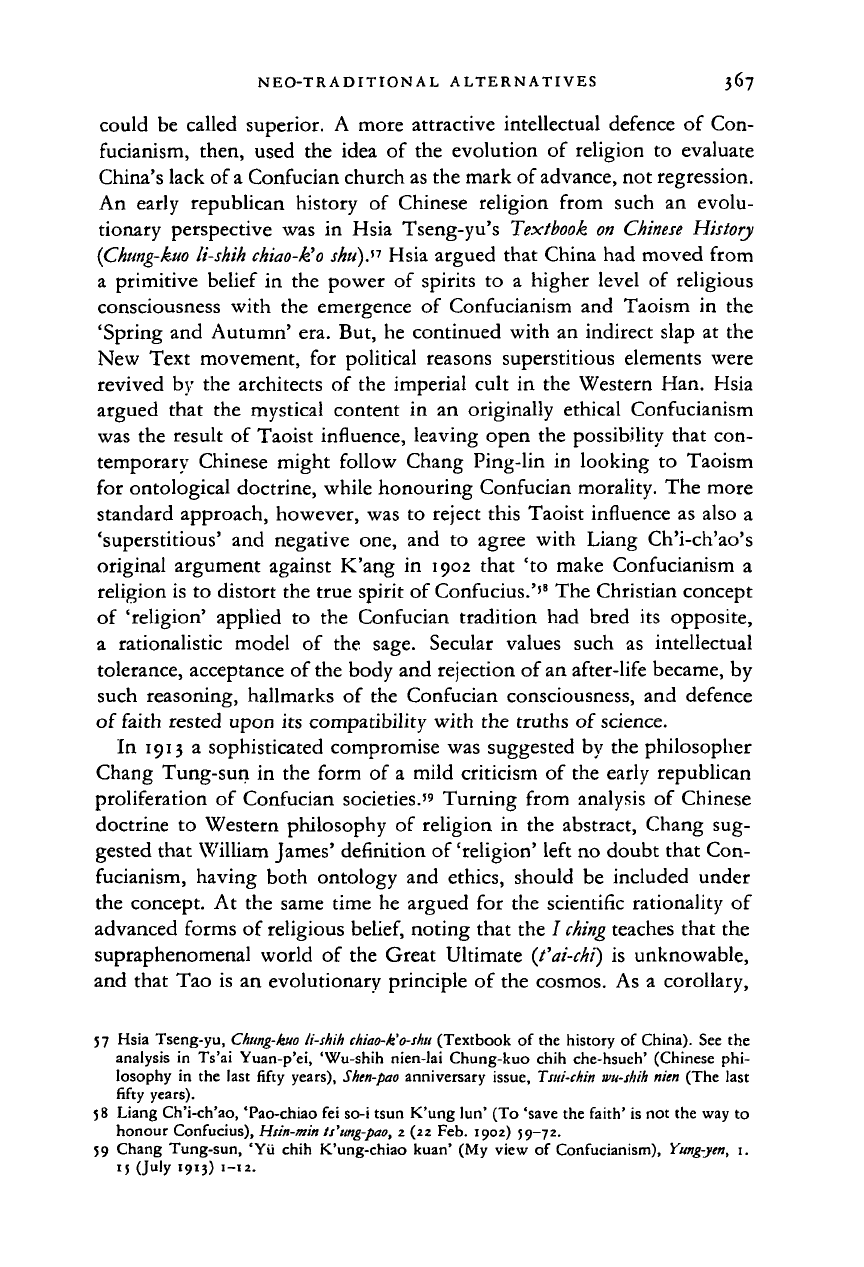
NEO-TRADITIONAL ALTERNATIVES 367
could
be
called superior.
A
more attractive intellectual defence
of
Con-
fucianism, then, used
the
idea
of
the evolution
of
religion
to
evaluate
China's lack of
a
Confucian church as the mark of
advance,
not regression.
An early republican history
of
Chinese religion from such
an
evolu-
tionary perspective was
in
Hsia Tseng-yu's Textbook on
Chinese
History
{Chung-kuo li-shih chiao-k'o
shu)."
Hsia argued that China had moved from
a primitive belief
in the
power
of
spirits
to a
higher level
of
religious
consciousness with
the
emergence
of
Confucianism and Taoism
in the
'Spring and Autumn' era. But, he continued with
an
indirect slap
at
the
New Text movement,
for
political reasons superstitious elements were
revived
by
the architects
of
the imperial cult
in
the Western Han. Hsia
argued that
the
mystical content
in an
originally ethical Confucianism
was the result
of
Taoist influence, leaving open the possibility that con-
temporary Chinese might follow Chang Ping-lin
in
looking
to
Taoism
for ontological doctrine, while honouring Confucian morality. The more
standard approach, however, was
to
reject this Taoist influence as also
a
'superstitious'
and
negative one,
and to
agree with Liang Ch'i-ch'ao's
original argument against K'ang
in
1902 that
'to
make Confucianism
a
religion is to distort the true spirit of Confucius.''
8
The Christian concept
of 'religion' applied
to the
Confucian tradition had bred
its
opposite,
a rationalistic model
of the
sage. Secular values such
as
intellectual
tolerance, acceptance of the body and rejection of an after-life became, by
such reasoning, hallmarks
of
the Confucian consciousness, and defence
of faith rested upon its compatibility with the truths
of
science.
In 1913
a
sophisticated compromise was suggested by the philosopher
Chang Tung-sun
in
the form
of
a mild criticism
of
the early republican
proliferation
of
Confucian societies." Turning from analysis
of
Chinese
doctrine
to
Western philosophy
of
religion
in
the abstract, Chang sug-
gested that William James' definition of 'religion' left no doubt that Con-
fucianism, having both ontology and ethics, should
be
included under
the concept.
At
the same time he argued
for
the scientific rationality
of
advanced forms of religious
belief,
noting that the
/
ching
teaches that the
supraphenomenal world
of
the Great Ultimate (t'ai-chi)
is
unknowable,
and that Tao
is
an evolutionary principle
of
the cosmos. As
a
corollary,
57 Hsia Tseng-yu, Chung-kuo li-shih
chiao-k'o-shu
(Textbook
of
the history
of
China). See
the
analysis
in
Ts'ai Yuan-p'ei, 'Wu-shih nien-lai Chung-kuo chih che-hsueh' (Chinese phi-
losophy
in the
last fifty years), Shtn-pao anniversary issue, Tsui-chin
wu-shih
nien (The last
fifty
years).
58 Liang Ch'i-ch'ao, 'Pao-chiao fei so-i tsun K'ung lun' (To 'save the faith'
is
not the way
to
honour Confucius), Hsin-min
ts'ung-pao,
2
(22 Feb. 1902) 59-72.
59 Chang Tung-sun, 'Yii chih K'ung-chiao kuan' (My view
of
Confucianism), Yung-yen,
1.
15 (July 1913) 1-12.
Cambridge Histories Online © Cambridge University Press, 2008
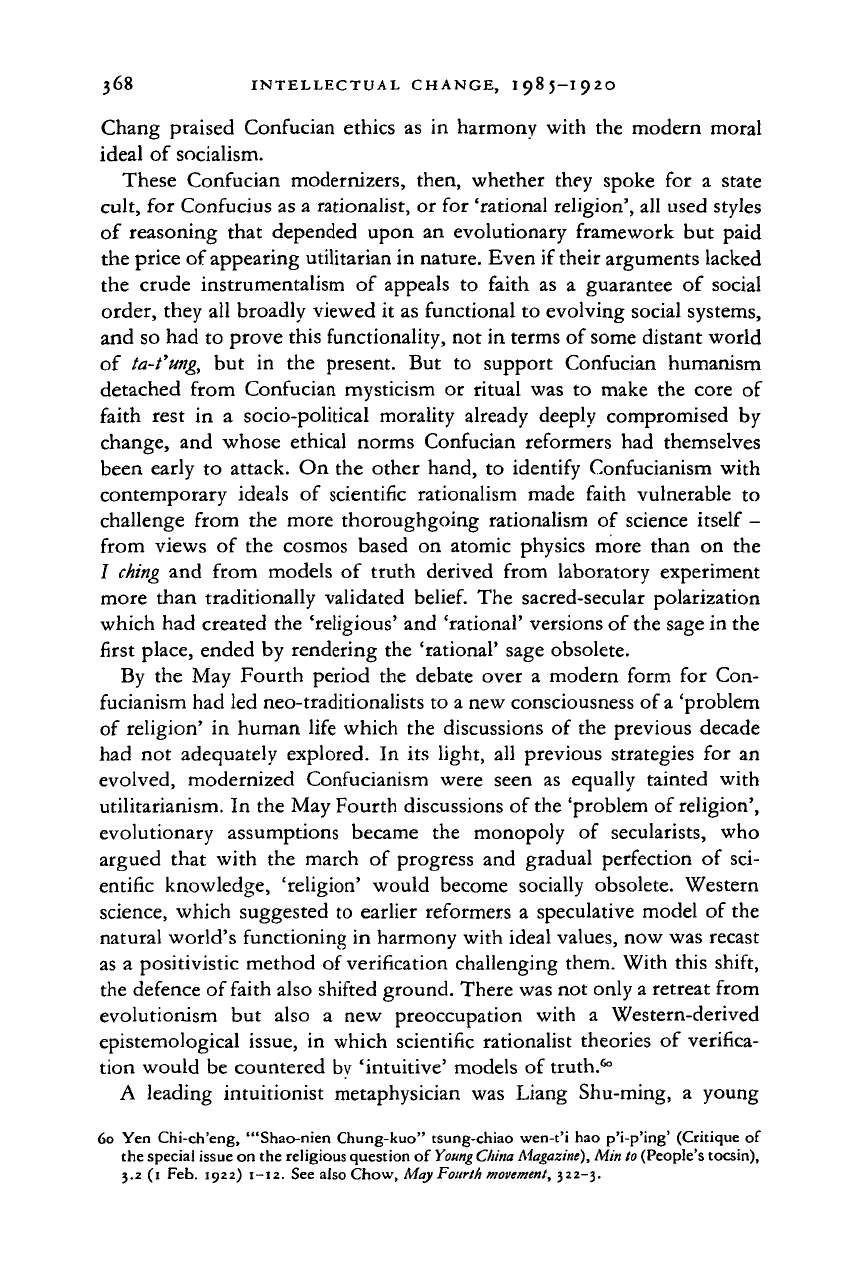
368 INTELLECTUAL CHANGE, I985-I920
Chang praised Confucian ethics
as in
harmony with
the
modern moral
ideal
of
socialism.
These Confucian modernizers, then, whether they spoke
for a
state
cult, for Confucius as
a
rationalist, or for 'rational religion', all used styles
of reasoning that depended upon
an
evolutionary framework
but
paid
the price of appearing utilitarian in nature. Even
if
their arguments lacked
the crude instrumentalism
of
appeals
to
faith
as a
guarantee
of
social
order, they all broadly viewed
it
as functional
to
evolving social systems,
and so had to prove this functionality, not in terms of some distant world
of ta-fung,
but in the
present.
But to
support Confucian humanism
detached from Confucian mysticism
or
ritual was
to
make
the
core
of
faith rest
in a
socio-political morality already deeply compromised
by
change,
and
whose ethical norms Confucian reformers
had
themselves
been early
to
attack.
On
the other hand,
to
identify Confucianism with
contemporary ideals
of
scientific rationalism made faith vulnerable
to
challenge from
the
more thoroughgoing rationalism
of
science itself
-
from views
of
the cosmos based
on
atomic physics more than
on the
I
ching
and
from models
of
truth derived from laboratory experiment
more than traditionally validated
belief.
The
sacred-secular polarization
which had created the 'religious' and 'rational' versions
of
the sage in the
first place, ended
by
rendering the 'rational' sage obsolete.
By
the
May Fourth period
the
debate over
a
modern form
for
Con-
fucianism had led neo-traditionalists to a new consciousness of
a
'problem
of religion'
in
human life which
the
discussions
of
the previous decade
had
not
adequately explored.
In its
light,
all
previous strategies
for an
evolved, modernized Confucianism were seen
as
equally tainted with
utilitarianism.
In
the May Fourth discussions of the 'problem of religion',
evolutionary assumptions became
the
monopoly
of
secularists,
who
argued that with
the
march
of
progress
and
gradual perfection
of
sci-
entific knowledge, 'religion' would become socially obsolete. Western
science, which suggested
to
earlier reformers
a
speculative model
of
the
natural world's functioning
in
harmony with ideal values, now was recast
as
a
positivistic method of verification challenging them. With this shift,
the defence of faith also shifted ground. There was not only a retreat from
evolutionism
but
also
a new
preoccupation with
a
Western-derived
epistemological issue,
in
which scientific rationalist theories
of
verifica-
tion would
be
countered by 'intuitive' models
of
truth.
63
A leading intuitionist metaphysician
was
Liang Shu-ming,
a
young
60 Yen Chi-ch'eng, '"Shao-nien Chung-kuo" tsung-chiao wen-t'i hao p'i-p'ing' (Critique
of
the special issue on the religious question
of
Young China
Magazine),
Min to
(People's tocsin),
3.2 (1 Feb. 1922) 1-12. See also Chow,
May Fourth
movement,
322-3.
Cambridge Histories Online © Cambridge University Press, 2008
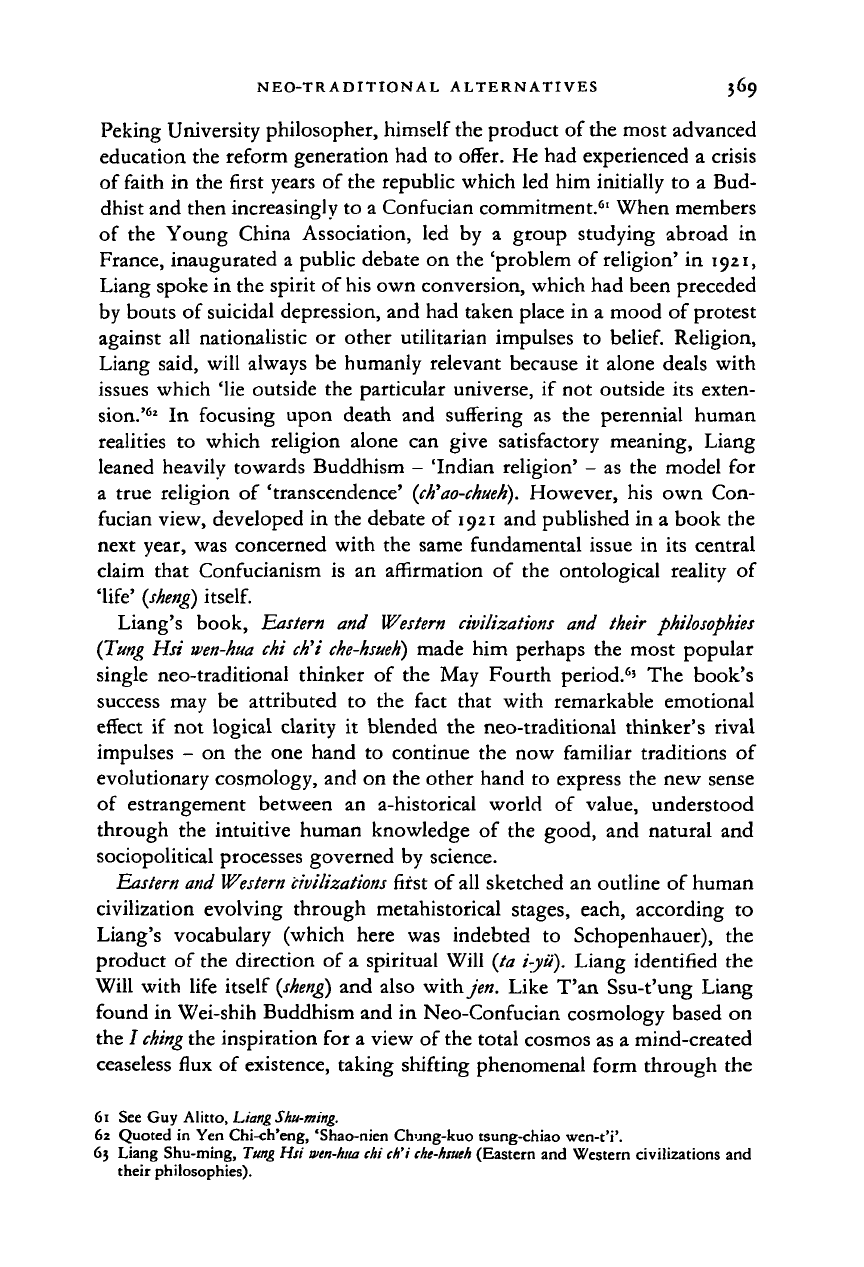
NEO-TRADITIONAL ALTERNATIVES 369
Peking University philosopher, himself the product of the most advanced
education the reform generation had to offer. He had experienced a crisis
of faith in the first years of the republic which led him initially to a Bud-
dhist and then increasingly to a Confucian commitment.
61
When members
of the Young China Association, led by a group studying abroad in
France, inaugurated a public debate on the 'problem of religion' in 1921,
Liang spoke in the spirit of his own conversion, which had been preceded
by bouts of suicidal depression, and had taken place in a mood of protest
against all nationalistic or other utilitarian impulses to
belief.
Religion,
Liang said, will always be humanly relevant because it alone deals with
issues which 'lie outside the particular universe, if not outside its exten-
sion.''
2
In focusing upon death and suffering as the perennial human
realities to which religion alone can give satisfactory meaning, Liang
leaned heavily towards Buddhism - 'Indian religion' - as the model for
a true religion of 'transcendence'
(ch'ao-chueh).
However, his own Con-
fucian view, developed in the debate of
1921
and published in a book the
next year, was concerned with the same fundamental issue in its central
claim that Confucianism is an affirmation of the ontological reality of
'life'
(slung)
itself.
Liang's book, Eastern and Western civilizations and their philosophies
(Tung Hsi
wen-hua
chi ch'i
che-hsueh)
made him perhaps the most popular
single neo-traditional thinker of the May Fourth period.
6
' The book's
success may be attributed to the fact that with remarkable emotional
effect if not logical clarity it blended the neo-traditional thinker's rival
impulses - on the one hand to continue the now familiar traditions of
evolutionary cosmology, and on the other hand to express the new sense
of estrangement between an a-historical world of value, understood
through the intuitive human knowledge of the good, and natural and
sociopolitical processes governed by science.
Eastern and Western civilizations
first
of all sketched an outline of human
civilization evolving through metahistorical stages, each, according to
Liang's vocabulary (which here was indebted to Schopenhauer), the
product of the direction of a spiritual Will (ta
i-yii).
Liang identified the
Will with life itself
(sheng)
and also withy>«. Like T'an Ssu-t'ung Liang
found in Wei-shih Buddhism and in Neo-Confucian cosmology based on
the I
ching
the inspiration for a view of the total cosmos as a mind-created
ceaseless flux of existence, taking shifting phenomenal form through the
61 See Guy Alitto, Liang
Shu-ming.
62 Quoted in Yen Chi-ch'eng, 'Shao-nien Chung-kuo tsung-chiao wen-t'i'.
65 Liang Shu-ming,
Tung
Hsi aen-hia
chi
ch'i
che-hsueh
(Eastern and Western civilizations and
their philosophies).
Cambridge Histories Online © Cambridge University Press, 2008
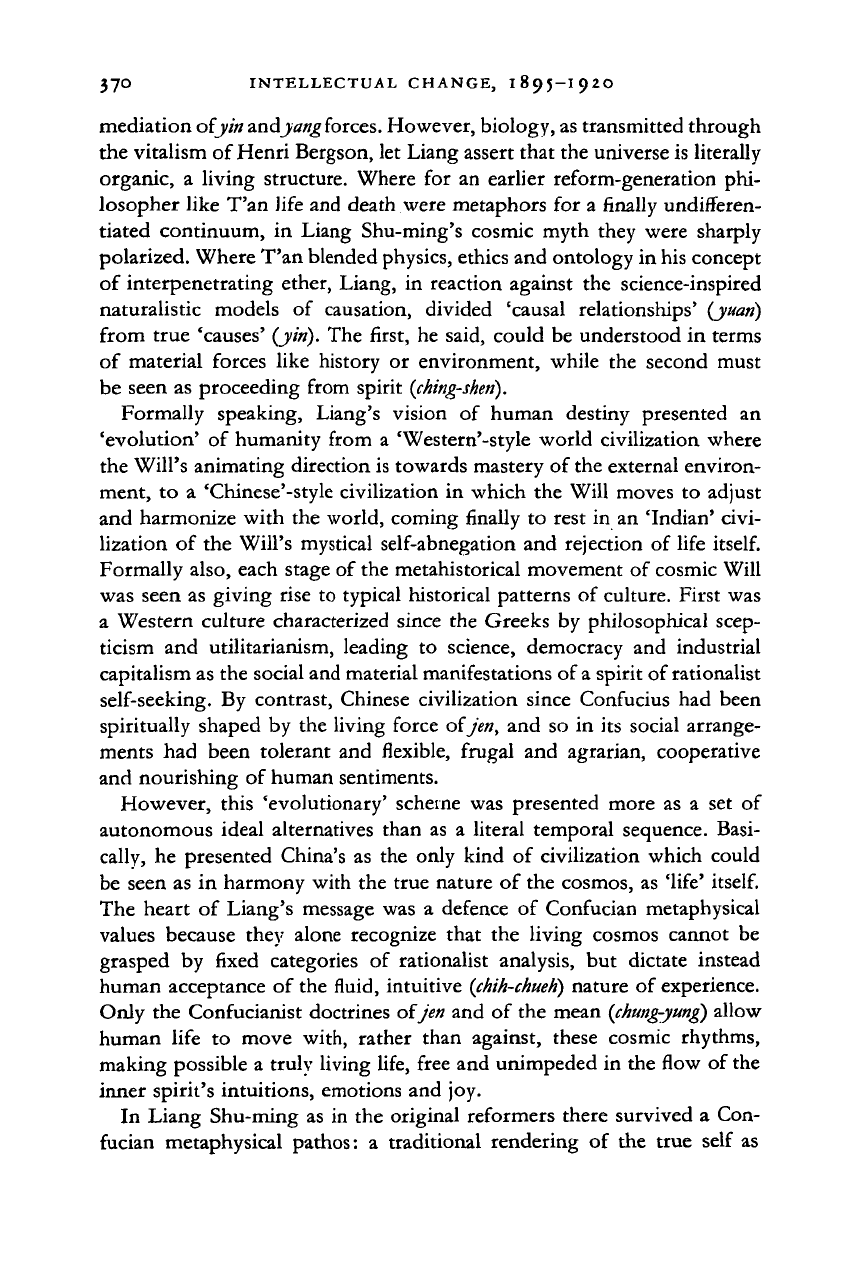
37° INTELLECTUAL CHANGE, 1895-1920
mediation oiyin
andyang
forces.
However, biology,
as
transmitted through
the vitalism
of
Henri Bergson,
let
Liang assert that
the
universe
is
literally
organic,
a
living structure. Where
for
an
earlier reform-generation
phi-
losopher like
T'an
life
and
death were metaphors
for a
finally undifferen-
tiated continuum,
in
Liang Shu-ming's cosmic myth they were sharply
polarized. Where
T'an
blended physics, ethics
and
ontology
in
his concept
of interpenetrating ether, Liang,
in
reaction against
the
science-inspired
naturalistic models
of
causation, divided 'causal relationships' {yuan)
from true 'causes'
(jiri).
The
first,
he
said, could
be
understood
in
terms
of material forces like history
or
environment, while
the
second must
be seen
as
proceeding from spirit
{ching-shen).
Formally speaking, Liang's vision
of
human destiny presented
an
'evolution'
of
humanity from
a
'Western'-style world civilization where
the Will's animating direction
is
towards mastery
of the
external environ-
ment,
to a
'Chinese'-style civilization
in
which
the
Will moves
to
adjust
and harmonize with
the
world, coming finally
to
rest
in an
'Indian' civi-
lization
of
the
Will's mystical self-abnegation
and
rejection
of
life
itself.
Formally also, each stage
of the
metahistorical movement
of
cosmic Will
was seen
as
giving rise
to
typical historical patterns
of
culture. First
was
a Western culture characterized since
the
Greeks
by
philosophical scep-
ticism
and
utilitarianism, leading
to
science, democracy
and
industrial
capitalism
as the
social
and
material manifestations
of
a
spirit
of
rationalist
self-seeking.
By
contrast, Chinese civilization since Confucius
had
been
spiritually shaped
by the
living force oijen,
and so in its
social arrange-
ments
had
been tolerant
and
flexible, frugal
and
agrarian, cooperative
and nourishing
of
human sentiments.
However, this 'evolutionary' scheme
was
presented more
as a
set
of
autonomous ideal alternatives than
as
a
literal temporal sequence. Basi-
cally,
he
presented China's
as the
only kind
of
civilization which could
be seen
as in
harmony with
the
true nature
of
the
cosmos,
as
'life'
itself.
The heart
of
Liang's message
was
a
defence
of
Confucian metaphysical
values because they alone recognize that
the
living cosmos cannot
be
grasped
by
fixed categories
of
rationalist analysis,
but
dictate instead
human acceptance
of the
fluid, intuitive
{chih-chueh)
nature
of
experience.
Only
the
Confucianist doctrines of jen
and
of
the
mean
{chung-yung)
allow
human life
to
move with, rather than against, these cosmic rhythms,
making possible
a
truly living life, free
and
unimpeded
in the
flow
of the
inner spirit's intuitions, emotions
and joy.
In Liang Shu-ming
as in the
original reformers there survived
a
Con-
fucian metaphysical pathos:
a
traditional rendering
of
the
true self
as
Cambridge Histories Online © Cambridge University Press, 2008
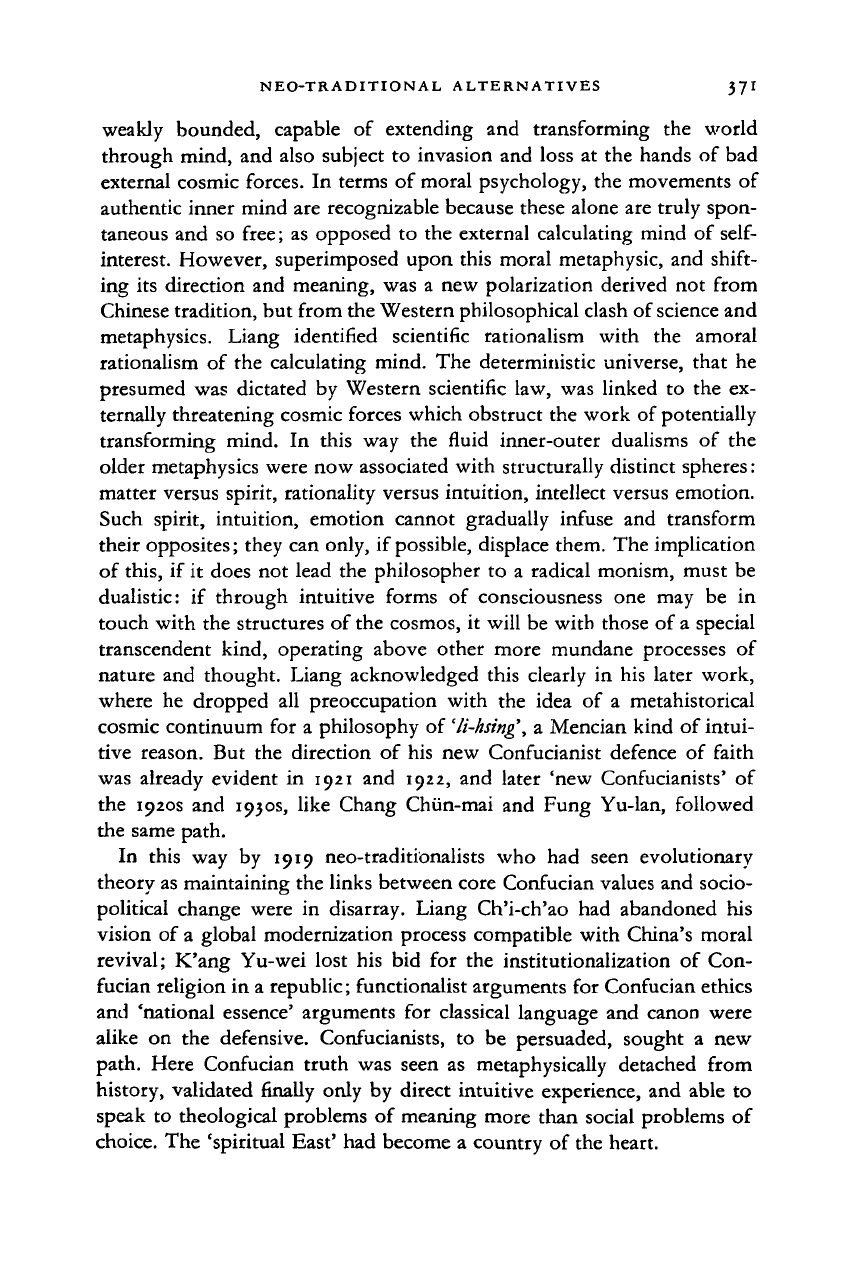
NEO-TRADITIONAL ALTERNATIVES 37I
weakly bounded, capable of extending and transforming the world
through mind, and also subject to invasion and loss at the hands of bad
external cosmic forces. In terms of moral psychology, the movements of
authentic inner mind are recognizable because these alone are truly spon-
taneous and so free; as opposed to the external calculating mind of
self-
interest. However, superimposed upon this moral metaphysic, and shift-
ing its direction and meaning, was a new polarization derived not from
Chinese tradition, but from the Western philosophical clash of science and
metaphysics. Liang identified scientific rationalism with the amoral
rationalism of the calculating mind. The deterministic universe, that he
presumed was dictated by Western scientific law, was linked to the ex-
ternally threatening cosmic forces which obstruct the work of potentially
transforming mind. In this way the fluid inner-outer dualisms of the
older metaphysics were now associated with structurally distinct spheres:
matter versus spirit, rationality versus intuition, intellect versus emotion.
Such spirit, intuition, emotion cannot gradually infuse and transform
their opposites; they can only, if possible, displace them. The implication
of this, if it does not lead the philosopher to a radical monism, must be
dualistic: if through intuitive forms of consciousness one may be in
touch with the structures of the cosmos, it will be with those of a special
transcendent kind, operating above other more mundane processes of
nature and thought. Liang acknowledged this clearly in his later work,
where he dropped all preoccupation with the idea of a metahistorical
cosmic continuum for a philosophy of
'li-hsing',
a Mencian kind of intui-
tive reason. But the direction of his new Confucianist defence of faith
was already evident in 1921 and 1922, and later 'new Confucianists' of
the 1920s and 1930s, like Chang Chiin-mai and Fung Yu-lan, followed
the same path.
In this way by 1919 neo-traditionalists who had seen evolutionary
theory as maintaining the links between core Confucian values and socio-
political change were in disarray. Liang Ch'i-ch'ao had abandoned his
vision of a global modernization process compatible with China's moral
revival; K'ang Yu-wei lost his bid for the institutionalization of Con-
fucian religion in a republic; functionalist arguments for Confucian ethics
and 'national essence' arguments for classical language and canon were
alike on the defensive. Confucianists, to be persuaded, sought a new
path. Here Confucian truth was seen as metaphysically detached from
history, validated finally only by direct intuitive experience, and able to
speak to theological problems of meaning more than social problems of
choice. The 'spiritual East' had become a country of the heart.
Cambridge Histories Online © Cambridge University Press, 2008
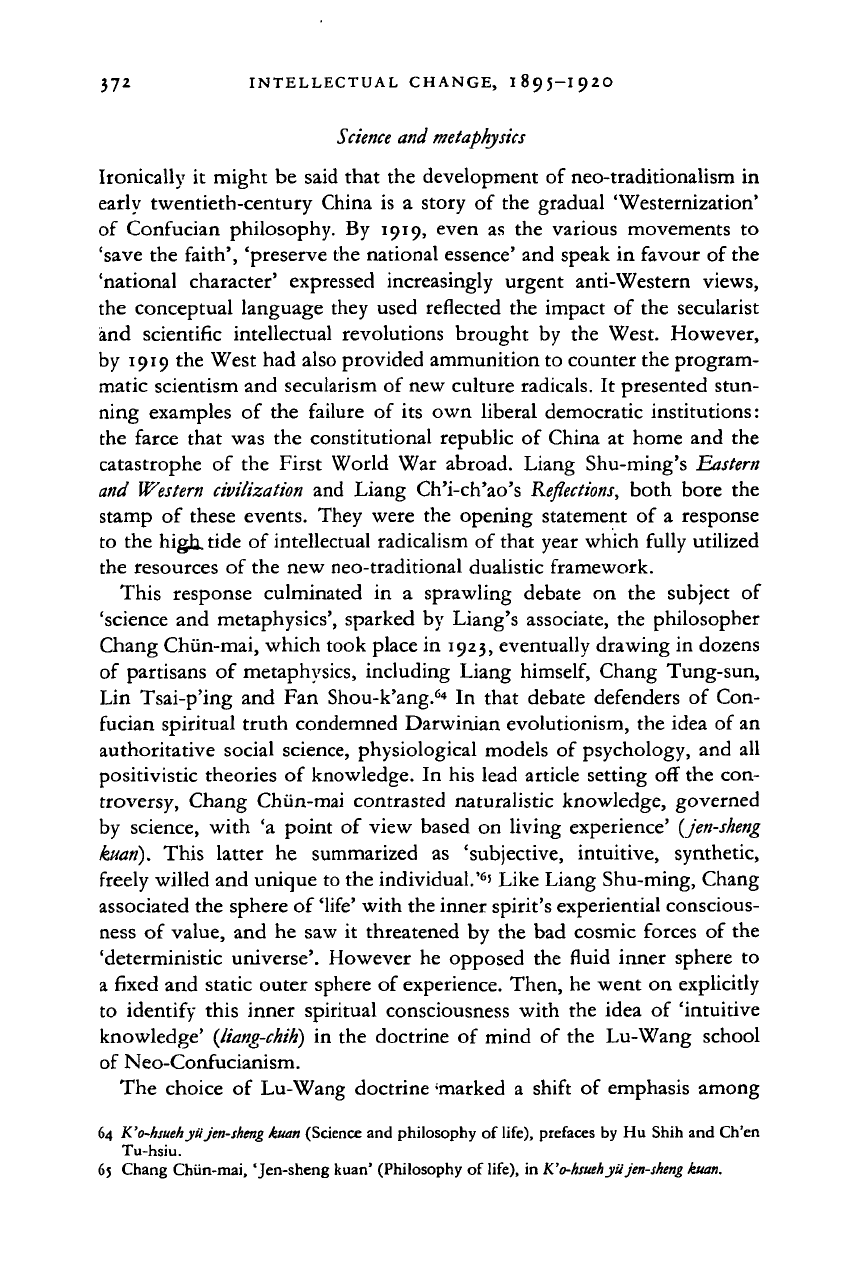
372 INTELLECTUAL CHANGE, 1895-I92O
Science and metaphysics
Ironically
it
might
be
said that
the
development
of
neo-traditionalism
in
early twentieth-century China
is a
story
of the
gradual 'Westernization'
of Confucian philosophy.
By
1919, even
as the
various movements
to
'save
the
faith', 'preserve the national essence'
and
speak
in
favour
of
the
'national character' expressed increasingly urgent anti-Western views,
the conceptual language they used reflected
the
impact
of the
secularist
and scientific intellectual revolutions brought
by the
West. However,
by 1919
the
West
had
also provided ammunition to counter the program-
matic scientism and secularism
of
new culture radicals.
It
presented stun-
ning examples
of the
failure
of its own
liberal democratic institutions:
the farce that
was the
constitutional republic
of
China
at
home
and the
catastrophe
of the
First World
War
abroad. Liang Shu-ming's Eastern
and
Western civilization
and
Liang Ch'i-ch'ao's
Reflections,
both bore
the
stamp
of
these events. They were
the
opening statement
of a
response
to
the
high, tide
of
intellectual radicalism
of
that year which fully utilized
the resources
of
the new neo-traditional dualistic framework.
This response culminated
in a
sprawling debate
on the
subject
of
'science
and
metaphysics', sparked
by
Liang's associate,
the
philosopher
Chang Chiin-mai, which took place
in
1923, eventually drawing
in
dozens
of partisans
of
metaphysics, including Liang
himself,
Chang Tung-sun,
Lin Tsai-p'ing
and Fan
Shou-k'ang.
64
In
that debate defenders
of
Con-
fucian spiritual truth condemned Darwinian evolutionism,
the
idea
of
an
authoritative social science, physiological models
of
psychology,
and all
positivistic theories
of
knowledge.
In his
lead article setting
off
the
con-
troversy, Chang Chiin-mai contrasted naturalistic knowledge, governed
by science, with
'a
point
of
view based
on
living experience'
(Jen-sheng
kuan).
This latter
he
summarized
as
'subjective, intuitive, synthetic,
freely willed and unique to the individual.'
6
' Like Liang Shu-ming, Chang
associated the sphere
of
'life' with the inner spirit's experiential conscious-
ness
of
value,
and he saw it
threatened
by the bad
cosmic forces
of the
'deterministic universe'. However
he
opposed
the
fluid inner sphere
to
a fixed
and
static outer sphere
of
experience. Then,
he
went
on
explicitly
to identify this inner spiritual consciousness with
the
idea
of
'intuitive
knowledge'
(Hang-chiK)
in the
doctrine
of
mind
of the
Lu-Wang school
of Neo-Confucianism.
The choice
of
Lu-Wang doctrine 'marked
a
shift
of
emphasis among
64 K'o-hsuehyujen-sheng kuan (Science
and
philosophy
of
life), prefaces
by Hu
Shih
and
Ch'en
Tu-hsiu.
65 Chang Chiin-mai, 'Jen-sheng kuan' (Philosophy
of
life),
in
K'o-hsuehyiijen-sheng kuan.
Cambridge Histories Online © Cambridge University Press, 2008
